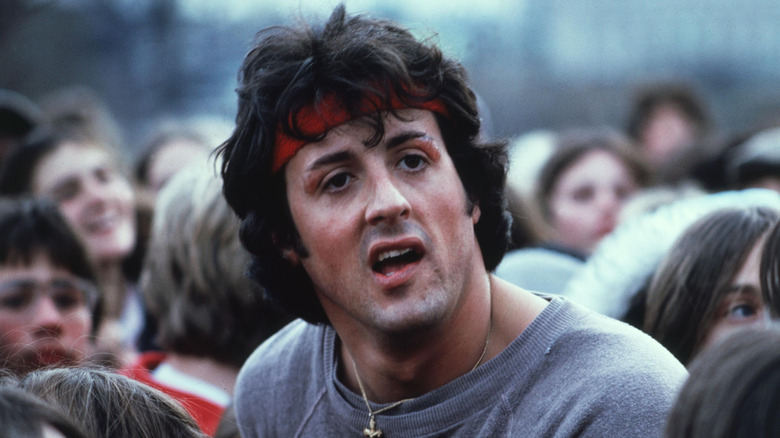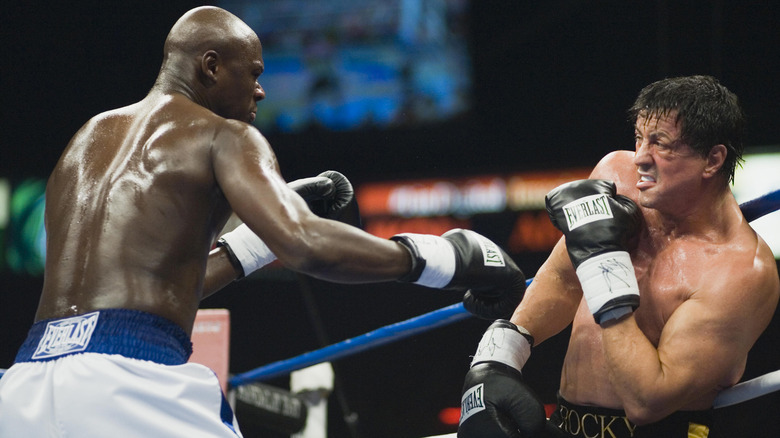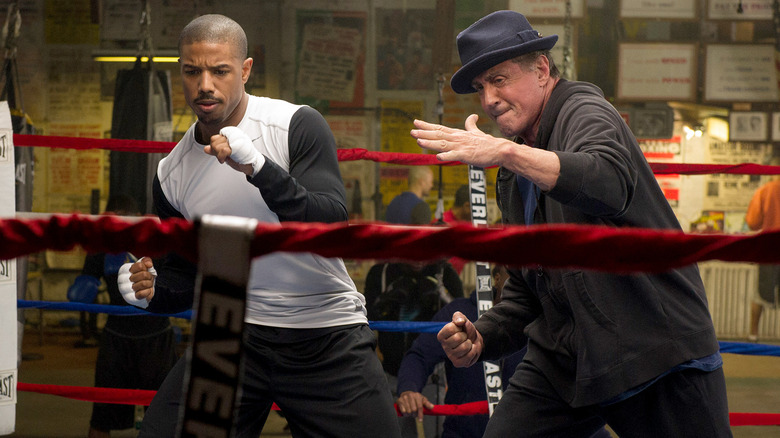The Correct Order To Watch The Rocky Franchise
Like the Italian Stallion, the "Rocky" films have seen some real highs and lows. Now spanning almost 50 years, it's a franchise that offers boundless entertainment, even at its most baffling. These movies are also formulaic to a "T." Even if you've yet to watch a single one (which is, presumably, why you're here), you probably already know what to expect: Rocky Balboa — or Adonis Creed — will be down on his luck when he's presented with a new opportunity to prove himself in the boxing ring. Or he'll be riding high only to get knocked flat on his ass and have to pick himself back up. Cue the training montage. It's predictable, but damn if it doesn't work like gangbusters, time and time over.
For the most part, the titles of the "Rocky" films are numerically ordered, which makes it pretty easy to figure out which one to watch after which. The only outlier is "Rocky Balboa," which throws a monkey wrench into the proceedings. After that, the series shifts its focus from Rocky to Adonis, beginning with "Creed." You could, in theory, jump into things there without being too lost, assuming all you're really interested in are the films starring Michael B. Jordan. If you do, however, you'll be missing a whole lot of helpful context. That and you won't get the experience of watching the franchise mutate and evolve with time — a process as fascinating as it is, quite frankly, perplexing.
Start with Rocky, then move onto Creed
To reiterate, you could skip all the Rocky-led films and start with the ones about Adonis. The "Creed" movies mostly stand on their own, but they're far less rewarding if you haven't already seen what came before them. As such, the correct viewing order is as follows:
- Rocky (1976)
- Rocky II (1979)
- Rocky III (1982)
- Rocky IV (1985)
- Rocky V (1990)
- Rocky Balboa (2006)
- Creed (2015)
- Creed II (2018)
- Creed III (2023)
The original "Rocky" is very much emblematic of 1970s New Hollywood cinema. It's a scrappy, character-driven sports drama about an Italian-American journeyman who's been reduced to collecting money for loan sharks when he gets a once-in-a-lifetime chance to go the distance with a world-champion boxer. For Sylvester Stallone, who also wrote the film in addition to playing the titular pugilist, it's a deeply personal story that parallels his own real-life journey and you can feel that in his performance. We, as the audience, revel in Rocky's victories as much as we share the weight of his failures.
It's no wonder "Rocky" spawned a franchise. For all of his woes, Rocky is way less tormented than other New Hollywood protagonists and his story is one of triumph over adversity, a far cry from the darkness of earlier '70s classics. You can readily grasp why the adorable, introverted Adrian Pennino (Talia Shire) falls head over heels for Balboa's charms. Even her brother Paulie (the late, always great Burt Young), for all his bluster and tough-guy outbursts, is just a big ol' softie at his core. And who doesn't love Rocky's cocky, charismatic frenemy Apollo Creed (Carl Weathers) or his grizzled, growling mentor Mickey Goldmill (Burgess Meredith)? These are the kind of characters you want to revisit, again and again.
How hard can you get hit and keep moving forward?
How, you might ask, did this franchise go from the verisimilitude of the first "Rocky" to Paulie getting a robot and Rocky single-handedly winning the Cold War in "Rocky IV"? It began with "Rocky II," which saw Stallone take over directing from John G. Avildsen. From there, the drama got soapier, the humor got broader, and even the training montages got more elaborate and flashier (and not necessarily for the worse). Stallone tried to reel things back with "Rocky V" (which saw Avildsen return to the director's chair), but even Sly would tell you the film's strained attempts at grittiness didn't stick (although it has its defenders).
When Stallone returned to the series 16 years later, he brought with him a newfound maturity as a director. The result was "Rocky Balboa," a more subdued affair that successfully tempers the franchise's melodramatic trappings with its melancholic vibes. It would've been a fine swan song for Rocky, too, had Ryan Coogler not come along and knocked one out of the park with "Creed," a film about Apollo's now-grown son Adonis (Jordan) being mentored by Rocky. Coogler's film is everything a legacy sequel should be. It honors the films that came before without being unduly beholden to them, using that foundation as the springboard for telling a brand-new story with its own unique concerns and voice.
The "Creed" sequels have seen other up-and-coming Black filmmakers (including Jordan) continue to carry the torch forward with near-equal success, even now that Stallone has retired the Rocky character. But again, as tempting as it might be to watch the first "Rocky" and then skip ahead to the "Creed" era, you shouldn't. As in life, you gotta learn how to take the losses to fully appreciate the wins.


